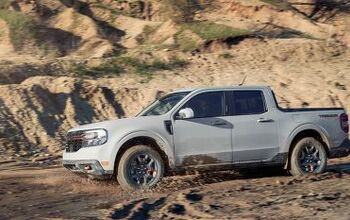You'll Never Guess Which Car Shoppers Distrust Chinese Vehicles the Most

Nah, that’s completely false. You know exactly which car buyers would turn up their noses at the prospect of bringing home a brand new Geely or GAC. (Aren’t these brand names inspiring?)
After becoming familiar names in Europe, new tariffs have made the imminent influx of Chinese-branded vehicles into the U.S. less than certain. Suddenly, the 2018 Detroit auto show, with its big display of shiny new GACs (including a luxurious minivan with La-Z-Boy-like rear seats), seems so long ago.
But pretend for a second that the new tariffs don’t exist, and that Chinese automakers are poised to open up American showrooms tomorrow. Who’s likely to consider one? Who isn’t? A recent study will almost certainly not surprise you.
The survey, published by Wards Auto, found that domestic vehicle owners were the least likely to consider a Chinese-brand vehicle. Only 22 percent of respondents said such a vehicle would be in the running. Owners of Korean cars proved the most likely, with 34 percent saying they’d maybe give one a go. That surely has something to do with the massively overhauled reputation of Korean vehicles, which didn’t get off to a great start after entering the U.S. marketplace in the late ’80s. Now, Korean brands dominate the upper ranks of J.D. Power’s initial quality survey.
Owners of Japanese and European brands split these two groups, with 30 percent of the Japanese crowd and 29 percent of the European crowd saying they’d consider a purchase.
Of the overall group of new car shoppers, 35 percent said they would flat-out refuse to buy a vehicle from a Chinese brand, 27 percent said they would consider one, and 38 percent fell into the mushy middle. Unsure, basically. Given China’s reputation for middling quality consumer goods, and with few Americans ever having had personal experience driving (or even sitting in) a Chinese-brand vehicle, it’s surprising the numbers aren’t stacked even further against China.
Opinion surveys are hardly scientific bedrock, and can hardly be counted on as an indicator of potential demand, though the responses do shed light on how a Chinese brand could pick up followers. It’s all about expectations. While nearly half of all respondents (45 percent) who said they would not buy a Chinese car listed quality and safety as their largest worries, a similar-sized group seemed ready to be wooed by rock-bottom prices.
Of those willing to consider a purchase, 40 percent listed price as the most compelling reason to buy a Chinese car. Eighteen percent listed technology as their top season, with safety coming in at 15 percent.
Both Geely (parent company of Volvo and Lotus) and GAC planned to enter the U.S. market in the next couple of years, but the Trump administration’s 25 percent tariff on Chinese auto imports might kibosh that strategy. In retaliation to Trump’s move, China upped its own tariffs on U.S. vehicles to 40 percent.
How quickly things can change.
[Image: GAC]

More by Steph Willems
Latest Car Reviews
Read moreLatest Product Reviews
Read moreRecent Comments
- ToolGuy This thing here is interesting.For example, I can select "Historical" and "EV stock" and "Cars" and "USA" and see how many BEVs and PHEVs were on U.S. roads from 2010 to 2023."EV stock share" is also interesting. Or perhaps you prefer "EV sales share".If you are in the U.S., whatever you do, do not select "World" in the 'Region' dropdown. It might blow your small insular mind. 😉
- ToolGuy This podcast was pretty interesting. I listened to it this morning, and now I am commenting. Listened to the podcast, now commenting on the podcast. See how this works? LOL.
- VoGhost If you want this to succeed, enlarge the battery and make the vehicle in Spartanburg so you buyers get the $7,500 discount.
- Jeff Look at the the 65 and 66 Pontiacs some of the most beautiful and well made Pontiacs. 66 Olds Toronado and 67 Cadillac Eldorado were beautiful as well. Mercury had some really nice looking cars during the 60s as well. The 69 thru 72 Grand Prix were nice along with the first generation of Monte Carlo 70 thru 72. Midsize GM cars were nice as well.The 69s were still good but the cheapening started in 68. Even the 70s GMs were good but fit and finish took a dive especially the interiors with more plastics and more shared interiors.
- Proud2BUnion I typically recommend that no matter what make or model you purchase used, just assure that is HAS a prior salvage/rebuilt title. Best "Bang for your buck"!


































Comments
Join the conversation
Doesn't matter if it is a Chinese brand, a European (or other) brand owned by the Chinese (such as Volvo) or a domestic or foreign brand model that happens to be built in China - Americans should not buy them. For other consumer goods, it's difficult to find something not made in China, but for autos, there's plenty of choice. More so than anything else, autos line the pockets of the PRC and with their totalitarian/uber-nationalist regime (not that we haven't been spinning towards a similar path), they are the biggest economic and military threat to America.
Never would I consider a Chinese car.